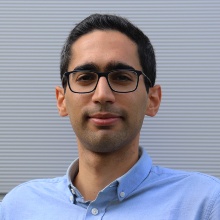Farid Mohammadi, SFB 1313 doctoral researcher at the Department of Hydromechanics and Modelling of Hydrosystems (research project D03), will give his milestone presentation "Development and Realization of Validation Benchmarks" on October 8, 2020 at 10 am.
Date: Thursday, October 8, 2020
Time: 10 am
Title: "Development and Realization of Validation Benchmarks"
Place: online presentation >>> If you are interested in participating in the lecture, please contact katharina.heck@iws.uni-stuttgart.de
Abstract
In the field of modeling, the word validation refers to simple comparisons between model outputs and experimental data. Usually, this comparison constitutes plotting the model results against data on the same axes to provide a visual assessment of agreement or lack thereof. While comparisons between model and data are at the heart of any validation procedure, there are a number of concerns with such naive comparisons.
First, these comparisons tend to provide qualitative rather than quantitative assessments and are clearly insufficient as a basis for making decisions regarding model validity. Second, naive comparisons often disregard or only partly account for existing uncertainties in the experimental observations or the model input parameters. Third, such comparisons cannot reveal whether the model is appropriate for the intended purposes, as they mainly focus on the agreement in the observable quantities.
These pitfalls give rise to the need for an uncertainty-aware framework that includes a validation metric. This metric shall provide a measure for comparison of the system response quantities of an experiment with the ones from a computational model, while accounting for uncertainties in both, in a rigorous way. To address this need, we have developed a statistical framework that incorporates a probabilistic modeling technique using a fully Bayesian approach. A Bayesian perspective on a validation task yields an optimal bias-variance trade-off against the experimental data and provide an integrative metric for model validation that incorporates parameter and conceptual uncertainty. Additionally, to accelerate the validation process for computationally demanding flow and transport models in porous media, the framework is equipped with a model reduction technique, namely Bayesian Sparse Polynomial Chaos Expansion.
We demonstrate the capabilities of the aforementioned Bayesian validation framework by applying it to an application for validation as well as uncertainty quantification of fluid flow in fractured porous media.
SFB 1313 research project D03: "Development and realisation of validation benchmarks"


